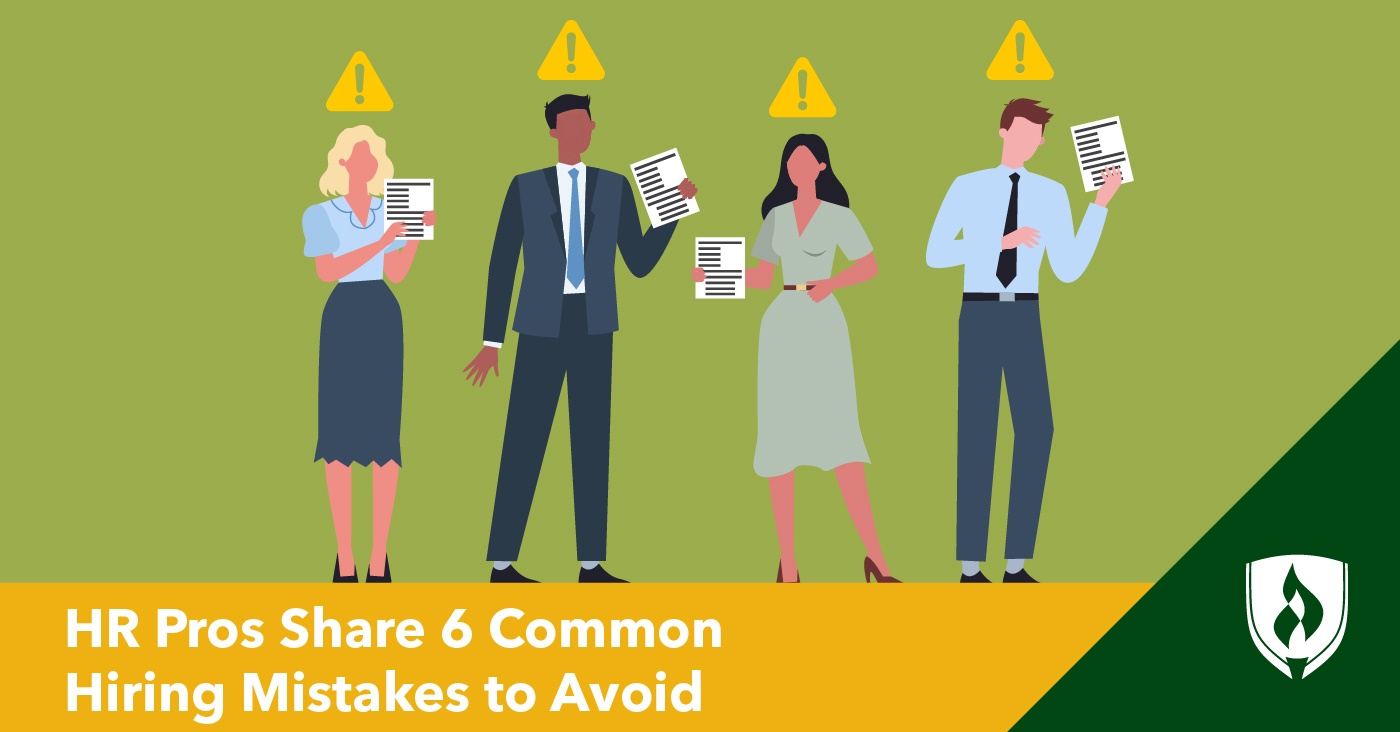
The hiring process can undoubtedly be a stressful time. Candidates will spend hours fussing over cover letters, resumes, potential interview questions and professional etiquette as they prepare to navigate what can be a life-changing series of interactions.
We’ve all been in those shoes, worrying about how maybe a slip-up, overshare or moment of being maybe a little too blunt could sink our chances of landing a new job. But job applicants aren’t the only people with reason to worry about hiring process mistakes.
Human resources (HR) professionals and the hiring managers they work closely with also face pressure to ensure they land the best possible candidate. Wasted time, wasted money, decreased employee morale and a host of ripple effects can come from a poorly executed hiring process.
So what can the folks on this side of the table do to help keep hiring mistakes to a minimum? We talked to several recruiters and HR pros to get a sense of the ways companies and organizations can mess up the hiring process—and how they can avoid these mistakes in the future.
6 Common hiring mistakes HR pros should have on their radar
1. Drawing out the hiring timeframe
In a 24/7 digital economy, everyone’s making decisions quickly, not just hiring managers.
“The most common interviewing mistake that we see is a lack of timeliness,” says Brendan Anderson, founder and head recruiter at Climate People. “If you're recruiting for a high-level position, it's likely that the top candidates are part of a competitive market.”
Anderson explains that top candidates are typically interviewing at multiple places, and many organizations risk losing out on good hires to other organizations because of a protracted hiring decision making process.
While it certainly hurts to see a quality candidate head elsewhere, Anderson believes the underlying cause of this mistake is rooted in positive intentions.
“Companies want to ensure the candidate is a perfect fit before extending an offer,” Anderson says. “To avoid this, we recommend that the companies and hiring managers condense their interview process. Ensure that you're asking questions that show both experience and company fit early on.”
Stacey Stratton, president of True Talent Group®, believes it’s key to have everything buttoned up ahead of time.
“When you are ready to make that hire, make sure you have everyone in your company onboard, the budget approved and keep HR in the loop,” Stratton says. “You don’t want to go through all of the work, find that perfect person and then not be able to move quickly.”
2. Making biased decisions, unconsciously or structurally
The best job search strategies have a fair, consistent approach. According to Tina Hawk, senior vice president of HR at GoodHire, a common hiring mistake is exhibiting unconscious bias in the selection process. Unconscious biases result in discrimination or prejudicial treatment against candidates of a certain background, age, gender, ethnicity or educational background.
“By prioritizing candidates who look or act alike, you'll alienate the many talented individuals based on factors entirely outside of their control,” Hawk explains.
The consequence of unconscious bias is the shrinking of a talent pool, as well as uniformity in the workplace.
“If there's one thing to avoid when hiring, it's uniformity,” Hawk says. “Uniformity breeds stagnancy, and stagnancy leaves your business trailing behind your competitors. You need the steady flow of unique ideas to innovate on a consistent basis.”
Hawk recommends building in steps in the hiring process to avoid this, such as anonymizing applications and resumes to foster fair treatment.
Joe Flanagan, senior employment advisor at VelvetJobs, sees inconsistent interview practices as another way bias contaminates the selection process.
“A lack of a consistent interview process that evaluates candidates on the same parameters and yardsticks can be problematic,” Flanagan explains. “If all the candidates are not judged on the same playing field, it can lead to erroneous hiring decisions.”
3. Not conducting reference checks
Another big hiring mistake is skipping over references checks.
“This is probably the most common mistake I have seen, and it continues to be a problem, especially for companies who are desperate to fill a position,” says Jim Sullivan, CEO and founder of JCSI.
Not conducting reference checks can result in hiring candidates who aren’t a good fit for the organization. References can be a very good way to get a sense of a candidate’s work style.
“It is important to have an idea of how this person works individually and in a team, and to gather more information on if they are a good fit for your team,” Sullivan says.
Lack of time is a common reason reference checks get overlooked. Sullivan recommends developing a form to use with every candidate.
“This form will have questions for the reference check which makes the process much quicker, and fair for each person,” Sullivan says. “Always plan for this as part of the hiring process. Making it a policy will help to avoid it being skipped.”
4. Searching for “unicorns”
Hiring managers wanting to fill a role on their team often become idealistic about who will be the perfect fit.
“The most common mistake hiring managers make is when they picture their ideal candidate and itemize their skills in a job description,” says Anne Campbell, client liaison manager at DigitalGrads. “The perfect candidate likely won’t exist, and your wish list will simply put off job hunters.”
Managing your expectations is crucial to successful hiring, adds Rowan O’Grady, president of US operations at Frank Recruitment Group.
“Don't walk into an interview looking for perfection,” O’Grady advises. “Setting unrealistic benchmarks before meeting potential employees is a recipe for failure.”
O’Grady gives an example of a client intent on finding a candidate with a very niche certification.
“They were unwilling to even look at other applicants, despite their past experience or qualifications, so the sourcing process was lengthy,” O’Grady recalls. “If I hadn’t stepped in and reminded them that a certification is something that can be earned, not something innate, they wouldn’t have the Vice President they do now.”
O’Grady believes that a shift in attitude can help avoid searching for candidates who don’t exist.
“Looking at the whole picture, considering how a candidate can grow into your team and thinking about a new employee as an investment will help you find talent that will impact your business long term,” O’Grady says. “Don't be blinded by looking for a perfect resume and forget what makes a business: the people.”
5. Moving too quickly
While moving too slowly can mean losing candidates to competitors, moving too fast can also be a problem.
“One of the mistakes that hiring managers make is to speed up the process of selection, which often results in hiring the wrong employee,” says Irene McConnell, managing director of Arielle Executive. “This practice is more common with startups who often rush to fill positions without analyzing the job requirements.”
McConnell empathizes with companies who move too swiftly. “They want to hire employees as soon as possible so that their company starts prospering,” she says.
But this quick action can be costly.
“Hiring the wrong employee may incur financial losses with respect to hiring and training in addition to time wastage,” McConnell points out.
Taking the time to screen the applicants and conduct in-depth interviews makes it possible to get a clearer view of how a candidate’s skills and personality will fit within your organization.
“If needed, go for the second round of interviews because the more you base your decision on these factors, the longer you extend their stay within the company,” McConnell adds.
As you might imagine, there’s a balancing act to maintain here. The case for speeding up or slowing down the hiring process will come down to individual circumstances. No matter what the pace is, staying in communication and providing as clear of a timetable as possible will help make for a smooth process.
6. Disregarding the importance of transferable skills
Much like seeking the “perfect” candidate, hiring managers can also focus only on credentials, missing out on transferable, soft skills.
“In this fierce job market, I think employers can fail to see transferable skills and capability,” says Stratton.
Flanagan agrees. “Many times, when faced with an urgency to close a position, hiring managers look only at the qualifications or experience and ignore the very visible red flags related to being a culture misfit,” Flanagan says.
Your organization’s existing training and development resources should factor into the candidates you select, Campbell adds.
“Consider broadening your training and professional development offering to widen your candidate pool,” Campbell suggests. “Hire for aptitude rather than experience.”
Look at candidates holistically, seeing them as a human, not just a set of skills.
“Qualifications and badges are useful for sizing up the skills a candidate has,” O’Grady says. “But they don't say anything about who a person is and what they can achieve.”
Finding your place in HR
Now that you’ve had a glimpse of what human resources and recruiting professionals navigate in finding and placing the right people for a job, you might be curious if this field fits your own skills and personality.
If you’d like to learn more about what it’s like to work in this field, start with our article “7 Surefire Signs You Should Be Working in HR.”
True Talent Group is a registered trademark of True Talent Group, LLC.




